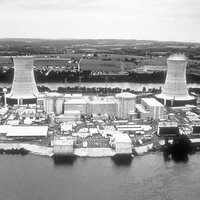Will the Deepwater Horizon disaster, already 2010's best candidate for the most significant "black swan" event, have a similar, long-lasting geopolitical impact as the Three Mile Island accident 30 years ago?
If that mishap had not occurred, it's very likely that the United States would have a vastly different, and superior, position vis-à-vis energy independence today. The U.S. could have moved down a similar path to that of France, which generates most of its electricity -- some 78 percent -- from nuclear power plants. Some of the side benefits the French enjoy as a result include much cleaner skies, since nuclear power plants have zero carbon emissions. It has also meant that Paris can move ahead with commitments to reduce greenhouse gases without damaging the country's economic health, in a way that Washington cannot. Nuclear energy also guaranteed a reliable source of electricity to power France's TGV high-speed rail network. By contrast, one barrier to California's plans to develop its own high-speed rail system is that it would require .5 percent of the state's electrical power, at a time when Sacramento has also committed itself to producing a third of its power from renewable energy sources. (The Golden State alone is the 12th-largest source of greenhouse gases in the world.) But in light of California's rolling blackouts in electrical power as demand continues to outstrip supply, the state might find it difficult to keep such a project functioning.
Finally, a "full speed ahead" commitment to nuclear power could have been pursued while also assuaging the concerns of the coal industry. Congress could have funded the research and development effort to make the technology for producing fuel from coal more practical and cost-efficient -- and mandated that the U.S. government purchase the finished product for the strategic reserve as well as for use by the military. Consider that today, even with the energy reduction and conservation measures that have been announced by the Pentagon, the military's nearly insatiable demand for fuel still redirects a portion of the U.S. defense budget to an interesting mix of geopolitical beneficiaries, among them the government of Hugo Chavez in Venezuela.

